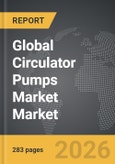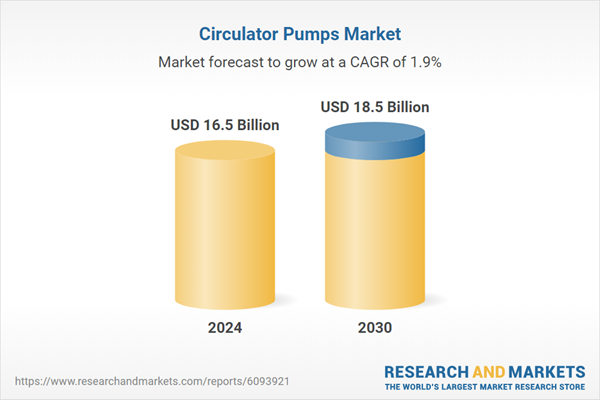Global Circulator Pumps Market - Key Trends & Drivers Summarized
Why Are Circulator Pumps Gaining Relevance in Energy-Efficient Heating, Cooling, and Water Circulation Systems?
Circulator pumps are becoming increasingly critical components in modern hydronic systems, providing reliable, energy-efficient circulation of hot or cold water in heating, ventilation, and air conditioning (HVAC) networks. Installed in residential, commercial, and industrial systems, these pumps ensure uniform temperature distribution, maintain pressure balance, and support closed-loop fluid circulation in applications such as underfloor heating, boiler systems, solar thermal setups, and chilled water distribution.With global energy efficiency standards tightening and sustainability goals becoming mainstream across building infrastructure, circulator pumps are being prioritized for their role in reducing energy consumption and optimizing thermal system performance. Their compact design, low-noise operation, and integration with thermostats or smart controllers make them essential for both new construction and retrofitting projects focused on green building certification and operational cost savings.
How Are Efficiency Regulations, Pump Design Advancements, and Smart Controls Enhancing Circulator Pump Performance?
Design evolution is centered around high-efficiency motors, intelligent speed modulation, and integrated sensors. Modern circulator pumps utilize electronically commutated motors (ECMs) that adjust pump speed based on real-time system demand, dramatically lowering energy use compared to traditional fixed-speed models. These variable-speed pumps not only improve hydraulic efficiency but also extend system lifespan by reducing stress on components.Innovations in impeller design, magnetic coupling, and noise-reduction features are improving fluid dynamics and operational quietness - especially valuable in residential and low-noise environments. Digital integration with building management systems (BMS), remote diagnostics, and user-friendly interfaces is enabling predictive maintenance and centralized control of multiple pumps across complex installations.
Regulatory frameworks such as the European ErP (Energy-related Products) Directive and equivalent efficiency mandates in North America and Asia-Pacific are accelerating the adoption of compliant, high-efficiency circulator pump models. Environmental labeling and government incentives are also influencing purchasing decisions in both the residential and commercial segments.
Which End-Use Applications and Regional Markets Are Fueling Circulator Pump Demand?
Key application areas include domestic hot water systems, hydronic heating and cooling circuits, geothermal heat pumps, solar thermal circulation, and district energy systems. Demand is strong in residential housing, office buildings, hospitals, hotels, and industrial facilities where consistent thermal performance and system reliability are critical.Europe is the largest and most mature market, supported by stringent building energy efficiency standards and widespread deployment of hydronic heating systems. North America follows with increasing adoption of high-efficiency circulators driven by HVAC upgrades and eco-friendly building initiatives. Asia-Pacific is experiencing rapid growth due to urban infrastructure development, rising awareness of energy conservation, and policy-driven investment in clean energy systems - especially in China, South Korea, and Japan.
What Are the Factors Driving Growth in the Circulator Pumps Market?
The circulator pumps market is expanding as energy efficiency, smart infrastructure, and climate-conscious building practices become non-negotiable in HVAC system design. These pumps are central to reducing energy losses, improving occupant comfort, and enabling responsive thermal management in buildings and industrial systems alike.Key growth drivers include increasing demand for high-performance HVAC solutions, stricter efficiency and emission regulations, integration of IoT-enabled pump control systems, and rising investment in renewable-based heating and cooling infrastructure. The global emphasis on decarbonizing buildings and reducing operational energy costs continues to make circulator pumps a strategic component of sustainable system design.
As global infrastructure shifts toward intelligent, energy-optimized systems, could circulator pumps become the default enabler of scalable and responsive fluid circulation across residential and commercial environments?
Report Scope
The report analyzes the Circulator Pumps market, presented in terms of market value (US$). The analysis covers the key segments and geographic regions outlined below:- Segments: Application (Industrial Circulation, Hot Water Heating System, Solar & Geothermal Systems, Air Conditioning, Domestic Water Recirculation, Other Applications); End-User (Commercial, Residential, Industrial).
- Geographic Regions/Countries: World; United States; Canada; Japan; China; Europe (France; Germany; Italy; United Kingdom; Spain; Russia; and Rest of Europe); Asia-Pacific (Australia; India; South Korea; and Rest of Asia-Pacific); Latin America (Argentina; Brazil; Mexico; and Rest of Latin America); Middle East (Iran; Israel; Saudi Arabia; United Arab Emirates; and Rest of Middle East); and Africa.
Key Insights:
- Market Growth: Understand the significant growth trajectory of the Industrial Circulation Application segment, which is expected to reach US$5.6 Billion by 2030 with a CAGR of a 2.5%. The Hot Water Heating System Application segment is also set to grow at 1.2% CAGR over the analysis period.
- Regional Analysis: Gain insights into the U.S. market, valued at $4.5 Billion in 2024, and China, forecasted to grow at an impressive 3.9% CAGR to reach $3.5 Billion by 2030. Discover growth trends in other key regions, including Japan, Canada, Germany, and the Asia-Pacific.
Why You Should Buy This Report:
- Detailed Market Analysis: Access a thorough analysis of the Global Circulator Pumps Market, covering all major geographic regions and market segments.
- Competitive Insights: Get an overview of the competitive landscape, including the market presence of major players across different geographies.
- Future Trends and Drivers: Understand the key trends and drivers shaping the future of the Global Circulator Pumps Market.
- Actionable Insights: Benefit from actionable insights that can help you identify new revenue opportunities and make strategic business decisions.
Key Questions Answered:
- How is the Global Circulator Pumps Market expected to evolve by 2030?
- What are the main drivers and restraints affecting the market?
- Which market segments will grow the most over the forecast period?
- How will market shares for different regions and segments change by 2030?
- Who are the leading players in the market, and what are their prospects?
Report Features:
- Comprehensive Market Data: Independent analysis of annual sales and market forecasts in US$ Million from 2024 to 2030.
- In-Depth Regional Analysis: Detailed insights into key markets, including the U.S., China, Japan, Canada, Europe, Asia-Pacific, Latin America, Middle East, and Africa.
- Company Profiles: Coverage of players such as Adidas AG, Allbirds, Inc., Eileen Fisher, Inc., Everlane, Inc., Fast Retailing Co., Ltd. (Uniqlo) and more.
- Complimentary Updates: Receive free report updates for one year to keep you informed of the latest market developments.
Some of the 37 companies featured in this Circulator Pumps market report include:
- Armstrong Fluid Technology
- Bell & Gossett (a Xylem brand)
- Biral AG
- Dab Pumps S.p.A.
- Danfoss Group
- Ebara Corporation
- Flamco Group
- Flowserve Corporation
- Grundfos Holding A/S
- Hitachi Industrial Equipment Systems
- ITT Inc.
- KSB SE & Co. KGaA
- Laing Thermotech (part of Xylem)
- Lowara (a Xylem brand)
- Nanfang Pump Industry Co., Ltd.
- Pentair plc
- Salmson (Wilo Group)
- Taco Comfort Solutions
- Wilo SE
- Zhejiang Dayuan Pumps Industrial Co.
This edition integrates the latest global trade and economic shifts into comprehensive market analysis. Key updates include:
- Tariff and Trade Impact: Insights into global tariff negotiations across 180+ countries, with analysis of supply chain turbulence, sourcing disruptions, and geographic realignment. Special focus on 2025 as a pivotal year for trade tensions, including updated perspectives on the Trump-era tariffs.
- Adjusted Forecasts and Analytics: Revised global and regional market forecasts through 2030, incorporating tariff effects, economic uncertainty, and structural changes in globalization. Includes historical analysis from 2015 to 2023.
- Strategic Market Dynamics: Evaluation of revised market prospects, regional outlooks, and key economic indicators such as population and urbanization trends.
- Innovation & Technology Trends: Latest developments in product and process innovation, emerging technologies, and key industry drivers shaping the competitive landscape.
- Competitive Intelligence: Updated global market share estimates for 2025, competitive positioning of major players (Strong/Active/Niche/Trivial), and refined focus on leading global brands and core players.
- Expert Insight & Commentary: Strategic analysis from economists, trade experts, and domain specialists to contextualize market shifts and identify emerging opportunities.
Table of Contents
Companies Mentioned (Partial List)
A selection of companies mentioned in this report includes, but is not limited to:
- Armstrong Fluid Technology
- Bell & Gossett (a Xylem brand)
- Biral AG
- Dab Pumps S.p.A.
- Danfoss Group
- Ebara Corporation
- Flamco Group
- Flowserve Corporation
- Grundfos Holding A/S
- Hitachi Industrial Equipment Systems
- ITT Inc.
- KSB SE & Co. KGaA
- Laing Thermotech (part of Xylem)
- Lowara (a Xylem brand)
- Nanfang Pump Industry Co., Ltd.
- Pentair plc
- Salmson (Wilo Group)
- Taco Comfort Solutions
- Wilo SE
- Zhejiang Dayuan Pumps Industrial Co.
Table Information
| Report Attribute | Details |
|---|---|
| No. of Pages | 283 |
| Published | January 2026 |
| Forecast Period | 2024 - 2030 |
| Estimated Market Value ( USD | $ 16.5 Billion |
| Forecasted Market Value ( USD | $ 18.5 Billion |
| Compound Annual Growth Rate | 1.9% |
| Regions Covered | Global |









